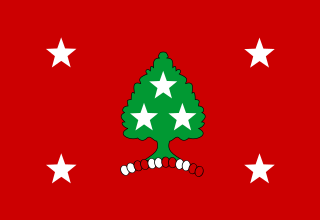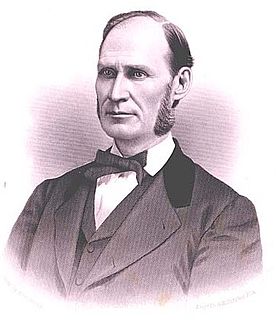Related Research Articles

Tennessee, officially the State of Tennessee, is a state in the southeastern United States. Tennessee is the 36th largest by area and the 16th most populous of the 50 states. It is bordered by eight states, with Kentucky to the north, Virginia to the northeast, North Carolina to the east, Georgia, Alabama, and Mississippi to the south, Arkansas to the west, and Missouri to the northwest. The Appalachian Mountains dominate the eastern part of the state, and the Mississippi River forms its western border. Nashville is the state's capital and largest city, with a 2019 population of 670,820 and a 2019 metro population of 1,934,317. Tennessee's second largest city is Memphis, which had a population of 651,073 and metro population of 1,346,045 in 2019.

The Governor of Tennessee is the head of government of the U.S. state of Tennessee. The governor is the only official in Tennessee state government who is directly elected by the voters of the entire state.

Earl Buford Ellington was an American politician who served as Governor of Tennessee from 1959 to 1963, and again from 1967 to 1971. Along with his political ally, Frank G. Clement, he helped lead a political machine that controlled the governor's office for 18 years, from 1953 to 1971.

Edward Hazzard East was an American attorney, judge, and politician. He served as Secretary of State for the state of Tennessee from 1862 to 1865, having been appointed by Andrew Johnson, the state's military governor under the Union Army occupation during the Civil War. East briefly served as the state's acting governor during the interim between Johnson's inauguration as U.S. Vice President on March 4, 1865, and the inauguration of the state's "elected" governor, William G. Brownlow, on April 5, 1865.

Harlan Mathews was a Democratic United States Senator from Tennessee from 1993 to 1994. He had previously served in the executive and legislative branches of state government in Tennessee for more than 40 years beginning in 1950.

The Tennessee Bureau of Investigation (TBI) is the state-wide investigative law enforcement agency within the state of Tennessee.
The Tennessee Department of Financial Institutions (TDFI) is a Cabinet-level agency within Tennessee state government, currently led by Greg Gonzales, Commissioner of Financial Institutions. The Department is responsible for regulating Tennessee's banking system, including state-chartered banks and credit unions, and handling consumer complaints involving state regulated financial institutions. The Department is divided into the Administrative/Legal Division, Bank Division, Compliance Division, Consumer Resources Division, and the Credit Union Division - each of which is led by an Assistant Commissioner.

The Tennessee Department of Correction (TDOC) is a Cabinet-level agency within the Tennessee state government responsible for the oversight of more than 20,000 convicted offenders in Tennessee's fourteen prisons, three of which are privately managed by the Corrections Corporation of America. The department is headed by the Tennessee Commissioner of Correction, who is currently Tony Parker. TDOC facilities' medical and mental health services are provided by Corizon. Juvenile offenders not sentenced as adults are supervised by the independent Tennessee Department of Children's Services, while inmates granted parole or sentenced to probation are overseen by the Department of Correction (TDOC)/Department of Parole. The agency is fully accredited by the American Correctional Association. The department has its headquarters on the sixth floor of the Rachel Jackson Building in Nashville.
The Tennessee Department of Environment and Conservation (TDEC) is a Cabinet-level agency within the government of the U.S. State of Tennessee, headed by the Tennessee Commissioner of Environment and Conservation.

The Grand Divisions are three geographic regions in the U.S. state of Tennessee, each constituting roughly one-third of the state's land area, that are geographically, culturally, legally, and economically distinct. The Grand Divisions are legally recognized in the state constitution and state law and are represented on the flag of Tennessee by the flag's three prominent stars.

The Oregon Bureau of Labor and Industries (BOLI) is an agency in the executive branch of the government of the U.S. state of Oregon. It is headed by the Commissioner of Labor and Industries, a nonpartisan, statewide elective office. The term of office is four years. The current Commissioner is Val Hoyle.
Executive Schedule is the system of salaries given to the highest-ranked appointed officials in the executive branch of the U.S. government. The president of the United States appoints individuals to these positions, most with the advice and consent of the United States Senate. They include members of the president's Cabinet, several top-ranking officials of each executive department, the directors of some of the more prominent departmental and independent agencies, and several members of the Executive Office of the President.
The government of Tennessee is organized under the provisions of the 1870 Constitution of Tennessee, first adopted in 1796. As set forth by the state constitution, Tennessee's government is divided into three branches: executive, judicial, and legislative branches. The seat of the government in Tennessee is in its capital city of Nashville.
The Tennessee Language Center (TLC), formerly known as the Tennessee Foreign Language Institute (TFLI), is an agency of the University of Tennessee's Institute for Public Service. Originally created as an agency of the State of Tennessee in 1986, TLC provides language classes, language teacher training and certification, and interpretation and translation services.
Justin Potter Wilson is an American lawyer and Republican politician who is Tennessee state Comptroller of the Treasury. He has been Tennessee deputy governor, a federal judicial nominee to the U.S. Court of Appeals for the Sixth Circuit, and an adjunct professor at Vanderbilt University Law School.

The following outline is provided as an overview of and topical guide to Tennessee:

In the United States, the state police is a police body unique to each U.S. state, having statewide authority to conduct law enforcement activities and criminal investigations. In general, state police officers, known as state troopers, perform functions that do not fall within the jurisdiction of the county sheriff, such as enforcing traffic laws on state highways and interstate expressways, overseeing the security of the state capitol complex, protecting the governor, training new officers for local police forces too small to operate an academy and providing technological and scientific services. They support local police and help to coordinate multi-jurisdictional task force activity in serious or complicated cases in those states that grant full police powers statewide.

The Oklahoma Secretary of Agriculture is a member of the Oklahoma Governor's Cabinet. The Secretary is appointed by the Governor, with the consent of the Oklahoma Senate, to serve at the pleasure of the Governor. The Secretary serves as the chief advisor to the Governor on agricultural, forestry and food issues.

John Williams Rose is an American politician and businessman serving as the U.S. Representative for Tennessee's 6th congressional district since 2019. A Republican, he was commissioner of agriculture for Tennessee and president of Boson Software, LLC.
References
- ↑ "Archived copy". Tennessee Department of Agriculture, Senior Staff. Archived from the original on 9 January 2017. Retrieved 30 December 2016.CS1 maint: archived copy as title (link)
- ↑ "Department of Agriculture: History." Tennessee Blue Book. Nashville: Tennessee Secretary of State, 2009. p. 144.
- ↑ "Department of Agriculture: History." Tennessee Blue Book. Nashville: Tennessee Secretary of State, 2009. p. 144.
- ↑ "Department of Agriculture: History." Tennessee Blue Book. Nashville: Tennessee Secretary of State, 2009. p. 144.
- ↑ "Department of Agriculture: History." Tennessee Blue Book. Nashville: Tennessee Secretary of State, 2009. p. 144.
- ↑ "Department of Agriculture: History." Tennessee Blue Book. Nashville: Tennessee Secretary of State, 2009. p. 144.
- ↑ "Department of Agriculture: History." Tennessee Blue Book. Nashville: Tennessee Secretary of State, 2009. p. 144.
- ↑ "Department of Agriculture: History." Tennessee Blue Book. Nashville: Tennessee Secretary of State, 2009. p. 144.
- ↑ "Former Commissioners". Tennessee Department of Agriculture. Retrieved 5 August 2018.
